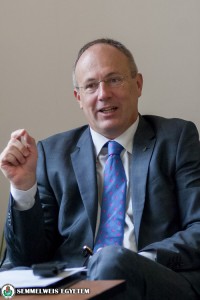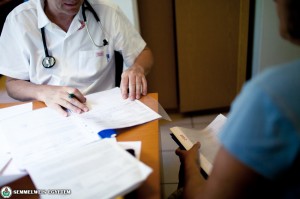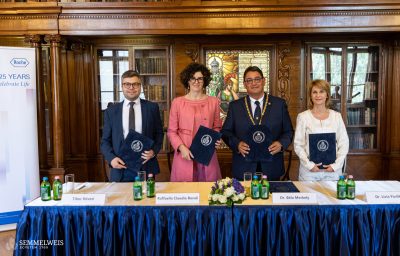Issues regarding development and human resources in health care, such as the migration of physicians and nurses will be dealt with Semmelweis University’s Health Services Management Training Centre, thus supporting the regional programme of the World Health Organisation (WHO). The institutions has recently been appointed as a WHO collaborating centre, becoming the third centre with such a title in this area following an association in Amsterdam and another in Ankara.
 “The migration of healthcare workers needs to be tackled on a European and global level, as the underlying mechanisms are interconnected. The highly qualified health care professionals from Africa are taken from former colonizers, migration in Asia is directed towards the prosperous countries rich in oil, in Great Britain and the other Western European countries workforce is imported from Central and Eastern Europe, whereas Hungary accommodates physicians coming from the Hungarian areas of the neighbouring countries.”, said Dr. Miklós Szócska, Director of the Health Services Management Training Centre.
“The migration of healthcare workers needs to be tackled on a European and global level, as the underlying mechanisms are interconnected. The highly qualified health care professionals from Africa are taken from former colonizers, migration in Asia is directed towards the prosperous countries rich in oil, in Great Britain and the other Western European countries workforce is imported from Central and Eastern Europe, whereas Hungary accommodates physicians coming from the Hungarian areas of the neighbouring countries.”, said Dr. Miklós Szócska, Director of the Health Services Management Training Centre.
Therefore, the activities listed in the Centre’s work plan include the establishment of a migration database at least on a European level in order to precisely follow up these mechanisms.
The appointment as a WHO collaboration centre will make the Health Services Management Training Centre become a regional knowledge centre of human resources in the field of health care. This entails the publication of all the information obtained from migration research and the creation of a regional centre for inquiries, references and advice.
The relationship between humans and technology will be a new area of research, which investigates the effects of healthcare data digitalisation and mobile applications on patient-doctor relationships, the treatment of chronic illnesses and issues related to workforce.
 Parallel with all these activities, the Health Services Management Training Centre is currently actively participating in the European Joint Action on Health Workforce Planning & Forecasting, which aims at predicting the effects of the aging population on human resources.
Parallel with all these activities, the Health Services Management Training Centre is currently actively participating in the European Joint Action on Health Workforce Planning & Forecasting, which aims at predicting the effects of the aging population on human resources.
“Based on the current findings, forecasting that the European health care labour market will be short of one million people by 2020 is not far-fetched.”, said Dr. Miklós Szócska.
Within the framework of the aforementioned project, the Management Training Centre is leading a workgroup (WP4), whose task is the analysis of the suitability of the global code of conduct on ethical recruitment issued by WHO.
Semmelweis University’s Health Services Management Training Centre belonging to the Faculty of Health and Public Administration was established 20 ago and it has been engaged with the migration of health care workers. In 2003 they were the first to study the effects of Hungary’s joining the European Union on the flux of doctors and health care workers. The appointment as a WHO collaboration centre is the result and acknowledgement of the institution’s activities.
The title will be conferred upon the institution by Zsófia Pusztai, The WHO Head of Country Office at a conference, where the work plan for the coming four years and the institution’s achievements will be presented.
Pálma Dobozi
Photo: Attila Kovács, Semmelweis University
Translation: Ágnes Raubinek


